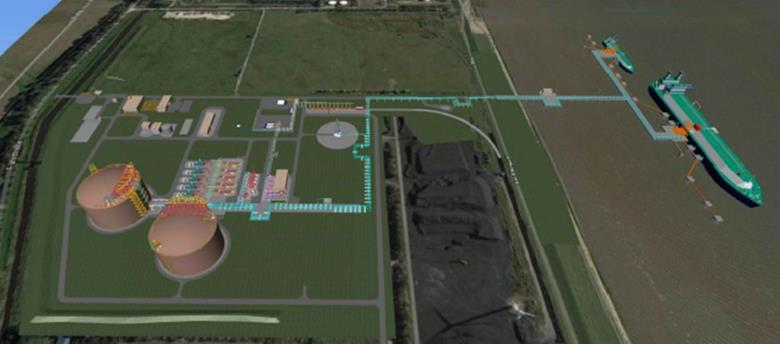The aim of German LNG Terminal is to develop, build, own and operate a multifunctional LNG import terminal in northern Germany. The terminal will contribute to energy diversification in Germany and will support the introduction of LNG as a cleaner fuel alternative in maritime and road transport, reducing the environmental impact of both shipping and heavy goods vehicles. The terminal will combine a variety of services such as unloading and loading of LNG ships, storage of LNG, regasification of LNG into the German natural gas pipeline grid and distribution of LNG in road tankers to nearby users.
Thinking to the longer term, with the vision of a decarbonised energy sector in Europe, LNG may play an essential transition role. The long-term future could be renewable electrical power being used to produce hydrogen through electrolysis of water. But, achieving that goal may require some transitional phases to be worked through. For example, the use of natural gas to produce hydrogen on steam methane reformers (SMRs) is in plan for the H21 Leeds City Gate project in the north of England. Those SMRs can then be supplemented, or replaced, by large-scale electrolysis units in the future.
Other countries in Asia are contemplating trade of ammonia which can be produced using solar power and then cracked to yield hydrogen or, according to a recent innovation from the CSIRO in Australia, the hydrogen bound up in the ammonia may be recovered using a novel membrane. When it comes to choosing between LNG or Ammonia as a hydrogen carrier, there are some similarities and some critical differentiators. They have a similar hydrogen content: 22.2% for ammonia and 25% for LNG. Both can be transported as a liquid to achieve a high energy density and they are both flammable. But ammonia carries the additional handling hazard of being corrosive and is toxic at tens of parts per million. Whichever-way path the future takes, this Heads of Agreement for the German LNG terminal takes Germany one step closer to the potential of achieving a decarbonised future.

Headquartered in Baden, Switzerland, the Axpo Group produces, trades and distributes energy reliably for over 3 million people and several thousand companies in Switzerland and in over 30 countries throughout Europe.
Domenico De Luca, Head Business Area Trading and Sales and member of the Executive Committee of Axpo Group, declares, “Axpo has been active in global LNG markets for nine years now and offers tailor-made physical LNG supply and hedging solutions. Our LNG business is one of our most important strategic growth areas: with the shutdown of numerous coal-fired power plants expected in the medium term, LNG is expected to gain further importance as an energy source and will be able to increase its market share in Europe. Our goal is to further optimise the delivery of LNG to our customers together with German LNG Terminal.”
Axpo’s LNG services include physical LNG supply, diversion rights, profit sharing, financial hedging structures, cancellation options and access to the most important international trade markets. Axpo’s growing LNG portfolio includes long-term natural gas supplies, a 5% stake in the Trans Adriatic Pipeline (TAP) and distribution channels in most European countries.
Rolf Brouwer, Managing Director of German LNG Terminal GmbH, the joint venture between Gasunie LNG Holding BV, Vopak LNG Holding BV and Oiltanking GmbH, a subsidiary of the Marquard & Bahls AG, Hamburg who are collectively driving forward Germany’s first LNG terminal, comments, “We are delighted about this Heads of Agreement with Axpo and welcome them as an additional strong partner for German LNG Terminal. We continue to powerfully move forward with the realisation of our terminal project. Obviously, an increasing number of market players are convinced of the future relevance of LNG for the German energy market and rely on our concept of a multi-service terminal with an independent terminal operator. Jointly with our terminal customers, we will contribute to an efficient and long-term energy supply to German customers.”
The preparations for the terminal’s permitting approval process are further moving forward. In spring 2019, German LNG Terminal GmbH will apply for the required permit for the terminal. The final investment decision is scheduled for Q4 2019. After receiving the necessary permits, construction work could then start in 2020 with the terminal most likely being operational by the end of 2022.